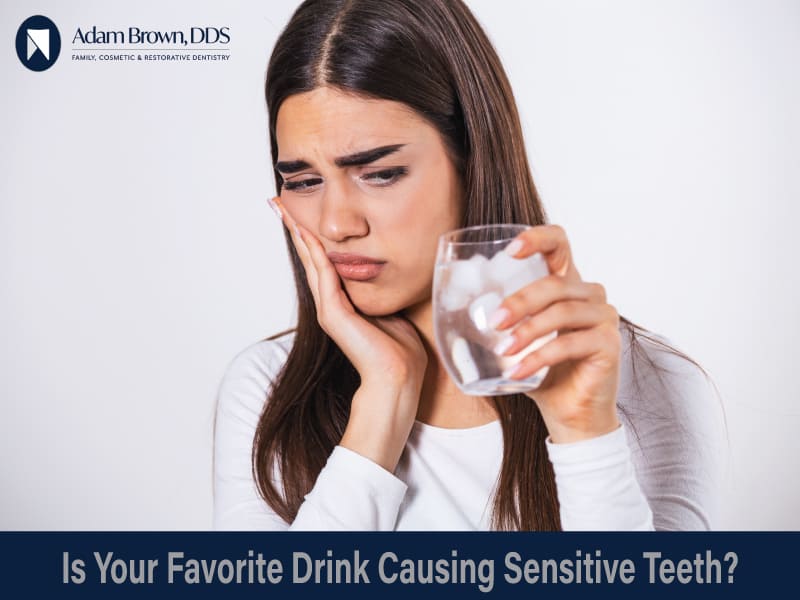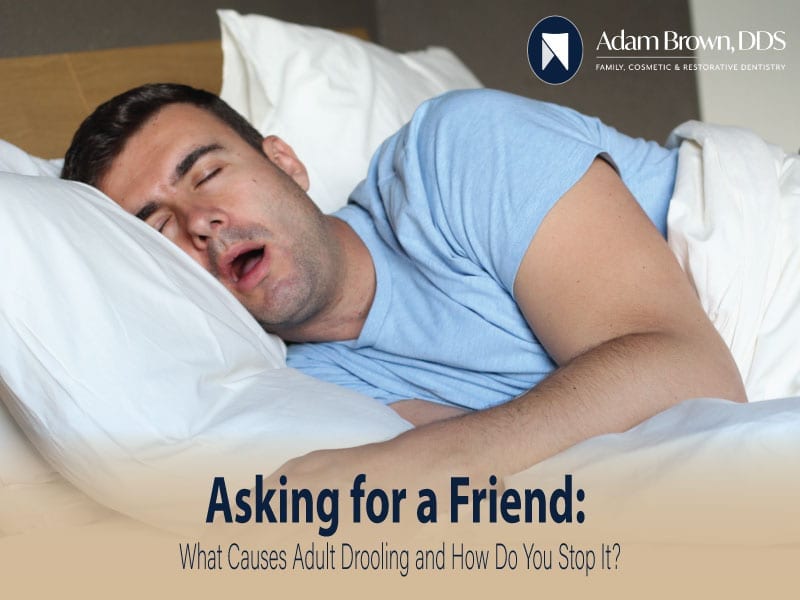Is Your Favorite Drink Causing Sensitive Teeth?

Do you think you might have sensitive teeth? If so, what drinks do you consume on a daily basis?
Beverages can have a significant impact on your oral health, beginning with your teeth. Drinks that are high in acidity soften tooth enamel. Over time, this can lead to sensitive, vulnerable teeth. If left unaddressed, cavities and tooth decay can ensue. And if you regularly drink beverages that are both acidic and sugary, then you’re at risk for double the damage.
Of course, how you approach what you drink will depend on your current habits and what you’re willing to change. Some people choose to steer clear of acidic and sugary beverages altogether, while others shoot for moderation. Below, we’ll discuss what types of drinks can do the most damage to your teeth, as well as other common causes of tooth sensitivity and how to counteract them.
How to Recognize Tooth Sensitivity
Essentially, you can tell if you have sensitive teeth if you experience unexpected discomfort or pain when drinking or eating something that’s hot or cold. It often reveals itself as a short and sharp pain in your teeth when biting into ice cream, sipping on an ice-cold beverage, drinking a steaming-hot soup, and the like. Sometimes, you can even feel it by simply breathing through your mouth. Exposure to cold air, sweet or acidic drinks and food, and brushing your teeth can also trigger a response.
Tooth sensitivity can cause a wide range of symptoms—from a mild twinge to unbearable discomfort. The pain can come suddenly, disappear, and come back without warning. Over time, the severity of the pain can also change. And you may not always feel the sensitivity in every tooth.
If you have sensitive teeth, you will feel it. Tooth sensitivity is common, and it can happen for a variety of reasons. However, if your teeth feel sensitive for more than a few weeks, you should visit your dentist. Adam Brown DDS and his team will evaluate you to determine the best treatment for your situation.
Common Beverages With High Acidity
Beverages are one of the most common causes of tooth sensitivity. When you frequently drink beverages with high acidic content, it can do a number on your oral health over time. Even though you may not think of liquids staying in your mouth for a long period of time (like tiny parcels of food sometimes do), the particles in certain drinks can attach to your teeth and damage the enamel. Let’s take a look at some common drinks you might consider moderating or cutting out of your diet:
Soda
We’ll start with one of America’s favorite beverages. If you pour a can of Coke on the hood of your car every day for a year, then it will erode the paint. Now, imagine what it does to your teeth over time.
While soda may be super tasty, it can be horrible for your teeth and oral health in general. It’s among the most acidic drinks you can buy, and it’s chock-full of sugar that will feed the harmful bacteria in your mouth. In short, regularly drinking soda leaves your teeth vulnerable to decay and cavities, and it can cause severe sensitivity.
It’s important to note that diet sodas are just as harmful to your oral health as regular sodas. Study after study has shown that sugar-free varieties dissolve tooth enamel at the same rate. Moreover, darker sodas are more likely to turn your teeth yellow.
Fruit Juice
Though it provides some great vitamins, most fruit juice is concentrated, which means it’s highly acidic. Cranberry and citrus-based juices are the most acidic. If you wish to continue drinking fruit juice, consider watering it down and/or using a straw to drink it. And if you’re worried about missing out on the nutrients if you cut out fruit juices, whole fruit is a better source of nutrition anyway, so you would be better served to simply eat the fruit itself.
Then there are the fruit punch varieties. These types of drinks essentially provide none of the benefits that come with real fruit juice. In fact, fruit punch rarely has real juice, which means none of those nutrients are there either. What they do have is high fructose corn syrup and sugar—lots of it. And the high acid content of fruit punch will eventually erode your enamel, cause sensitive teeth, and worse unless you reign in your intake.
Sports and Energy Drinks
Similar to fruit punch beverages, sports and energy drinks, like Gatorade and Monster, are loaded with sugar and highly acidic. As such, consuming them too often can lead to enamel erosion and vulnerable teeth. Nonetheless, sports drinks are an excellent source of hydration and electrolytes, so if you exercise regularly, you may not want to remove them from your diet altogether.
Alcohol
While not overconsuming alcohol is critical for your health and well-being anyway, drinking too much alcohol can negatively impact your teeth specifically. Wine is perhaps the most harmful for teeth. Because red wine tends to stain teeth, many people opt for white wine instead. However, white wine contains more acid, which means that it can cause your teeth to erode more quickly.
Liquor, such as vodka and whiskey, is also acidic and can cause teeth sensitivity and other problems over time. And while there is evidence to suggest that beer can be beneficial to your oral health, the acid in beer can do damage to your teeth unless you drink in moderation. Plus, dark barley is known to stain teeth.
Another factor to consider is that saliva plays a critical role in keeping your teeth moist and removing bacteria and plaque from the surface of your teeth. Alcohol can dry out your mouth. So, if you drink alcohol, be sure to drink water along with it to stay hydrated.
Coffee
Different coffee roasts are often distinguished by their level of acidity, which leads many people to assume that coffee is a highly acidic beverage. But next to some of the other drinks on this list, the acid content in coffee is quite moderate. And evidence suggests that drinking coffee in moderation can actually benefit your teeth and help prevent cavities.
Of course, we’re talking about black coffee. If you add sweetener to your Java, you get the same risks that come with drinking other types of sugary beverages.
Tea
Green and white tees are known for promoting oral health. But when it comes to iced teas, which are often black teas with sugar or other types of sweetener, it’s a different story. Most iced teas are very acidic and packed with sugar. And some of the most popular iced tea brands can do more damage to your teeth than sodas.
Sparkling Water
Sparkling water is viewed as being relatively harmless. And in many ways, that’s true. However, sparkling water can be quite acidic, especially those that are flavored or naturally essenced with fruit. In some cases, flavored sparkling water can be more erosive than orange juice or other concentrated fruit juices. While most products won’t have a big impact on your overall health, it’s best to moderate how many you drink in a day and make regular filtered water your go-to.
Beneficial Beverages
Since we’ve covered quite a few beverages that are not so good for your teeth, it’s only fair that we talk about some that are! For example, milk is one of the best liquids you can drink for your oral health. It’s full of proteins, vitamins, and minerals that can strengthen and repair tooth enamel. Its most prominent vitamin, vitamin D, helps to combat gum disease because and reduce inflammation in the gums. And the protein casein helps to prevent tooth decay by forming a protective film over the surface of your teeth.
As previously mentioned, green and white teas can be beneficial to your teeth. They are full of antioxidants that reduce inflammation in the gums and help stave off harmful bacteria. Unlike black tea, green and white teas will not stain your teeth. Furthermore, white tea is an excellent natural source of fluoride, which can help your enamel stay strong. Just like coffee, however, the innocence of these teas is thrown out the window when you start adding sugar or other sweeteners.
Other Common Causes of Tooth Sensitivity
Acidic and sugary beverages are not the only thing that can cause sensitivity. Let’s take a look at some other culprits to be aware of:
Brushing Too Hard
If you’re an over-enthusiastic brusher, meaning you brush your teeth too often or too hard, then you run the risk of getting sensitive teeth. It can also happen from using a hard-bristle toothbrush. You should never brush more than three times a day, and you should never use overly abrasive toothpaste.
If you prefer to brush after each meal, consider switching to a soft-bristled toothbrush, as well as a toothpaste specially formulated for sensitive teeth. And brush gently, even if it means using your non-dominant hand to hold the brush until you get used to brushing lightly.
You might also consider investing in an electric toothbrush. Most of the leading models come with soft bristles, and since the toothbrush does the work for you, all you have to do is guide it lightly across your teeth and gums.
Grinding Your Teeth
Another common cause of tooth sensitivity is bruxism, which is when you grind your teeth or clench your jaw. Most people do this when they sleep, and it can severely and quickly wear down your teeth’ enamel. You may subconsciously grind your teeth during a poor night’s sleep, or even during the day in high-stress situations.
Becoming aware of bruxism is the first step of resolving it. If you recognize that you grind your teeth or clench your jaw, start incorporating stress-relieving activities into your routine, such as deep breathing, yoga, and meditation. Also, talk to your dentist about whether or not you should use a mouthguard while you sleep.
Receding Gums
No one is immune to gum recession. Over time, the tissue around your teeth will wear away. But the recession should not be severe.
A lack of proper oral hygiene can cause your gums to recede at a faster rate and lead to periodontal disease. In extreme cases, this can cause the dentin around the roots of your teeth to become exposed, or even the roots themselves. Unsurprisingly, this can make for some very sensitive teeth! Brushing your teeth correctly, using the right bristles and toothpaste, and taking other oral hygiene measures will help you prevent severe gum recession.
Other Dental Problems
Cavities and tooth decay are common culprits for tooth sensitivity. And these are more prevalent around fillings and worn-down crowns. Also, if you have a cracked or broken tooth, the nerve of the tooth may be exposed, which can also cause sensitivity. If you think you have any of these issues, contact your dentist as soon as possible.
In Sum
Tooth sensitivity is often a sign that change is in order. Take an honest assessment of your diet, and see if there are any acidic and sugary beverages you need to cut back on or eliminate. And lookout for the other common culprits of sensitive teeth. Finally, if you’re overdue for a checkup or are experiencing any dental issues, don’t hesitate to schedule an appointment with Adam Brown DDS!

